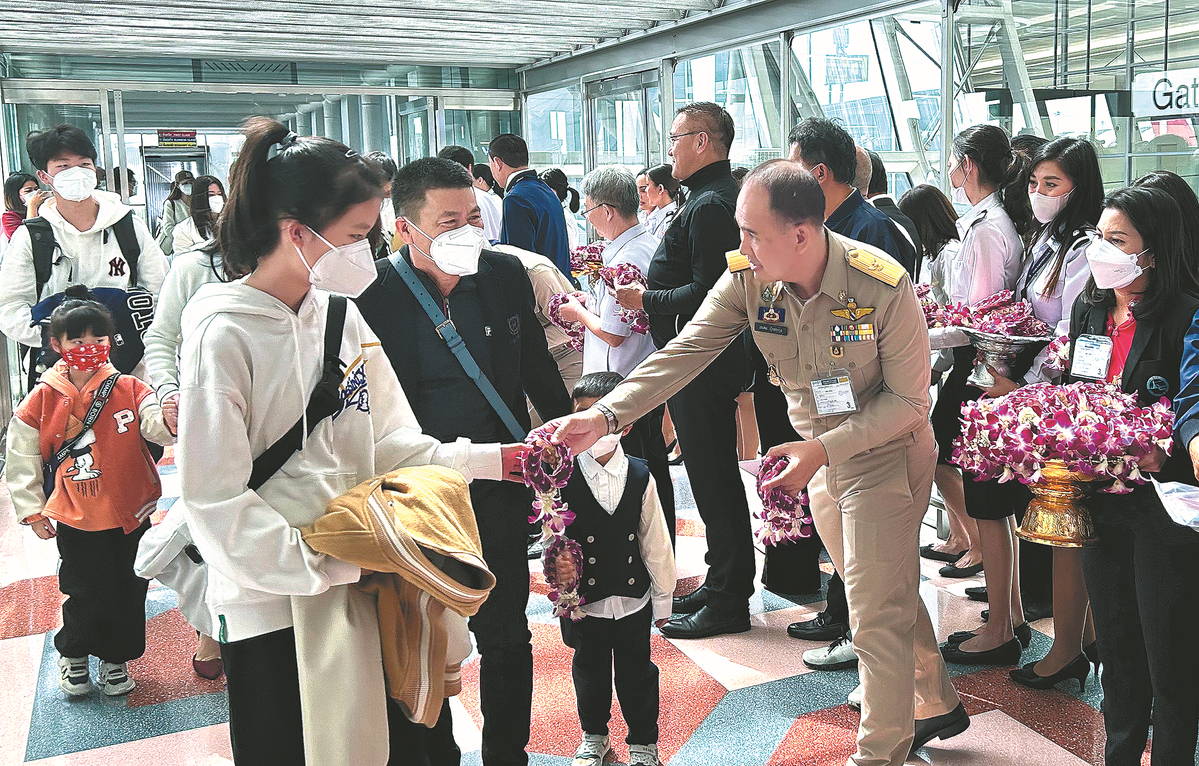
China's recent optimization of its COVID-19 response and the gradual return of Chinese citizens' overseas travel have encouraged those working in the tourism sectors of Asia-Pacific countries.
In the eyes of a Thai tuk-tuk driver who gave his name as Mak, the return of Chinese tourists means the revival of Thailand's economy. He hopes the hustle and bustle of foreign tourists on Bangkok's streets before the pandemic hit three years ago will soon come back.
Government expectations
In 2019, Thailand welcomed about 40 million foreign tourists, nearly 30 percent of whom were Chinese.
Thai Finance Minister Arkhom Termpittayapaisith said that China's gradual restoration of its citizens' overseas travel and other favorable factors will boost Thailand's tourism sector — Thailand's key economic growth contributor — pushing the Thai economy to grow 3.8 percent in 2023.
Philippine President Ferdinand Romualdez Marcos Jr invited Chinese to visit his country as tourists, students and investors. "I shall push for the resumption of tourism and cultural cooperation between our two countries," he said.
Indonesian Tourism and Creative Economy Minister Sandiaga Uno said the COVID-19 pandemic has had a huge negative impact on many sectors of Indonesia, including tourism.
"We lost almost 1 million-plus jobs," he said, adding that cooperation with China is very important for the recovery of Indonesia's tourism sector.
Cambodian Prime Minister Samdech Techo Hun Sen said he was very pleased to welcome back Chinese tourists, saying that their presence is vital to the country's tourism and economic growth.
"When China reopens its borders, flights will increase exponentially, so we hope to welcome about 2 million Chinese tourists again (in 2023)," Hun Sen said.
Preparations ready
The tourism sectors of Asia-Pacific countries have been gearing up for the return of Chinese tourists in the new year.
In New Zealand, some travel agencies have been communicating with their Chinese counterparts and customizing the latest tour itineraries for incoming Chinese tourists.
Li Ruiqin, managing director of China Travel Service (NZ) Ltd, said Chinese tourists spend an average of NZ$4,900 ($3,124.73) per person when staying in New Zealand.
The orderly resumption of outbound travel for Chinese tourists will be "a major boon to New Zealand's tourism industry", she said.
Travel specialist He Qingyuan in Australia said as the Chinese Lunar New Year holiday is around the corner, He, along with his peers, is customizing exclusive tours for Chinese visitors.
Yuthasak Supasorn, governor of the Tourism Authority of Thailand, said the tourism sector is gearing up for the return of Chinese tourists. Besides their favorite activities of visiting beaches and enjoying the food, "we would like to promote exclusive tour packages in the northeast region, the lesser visited corner of Thailand filled with natural beauty and authentic Thai culture", he said.
On the world-famous Boracay island in central Philippines, the once-closed Chinese restaurants have been reopening one by one and some local travel agencies have produced tour packages themed around the Chinese Lunar New Year, hoping to lure the first batch of Chinese tourists after the border reopens.
Indonesia's "paradise on Earth", Bali, is no exception. Azril Azahari, chairman of the Indonesia Tourism Intellectual Association, said he expects an early arrival of Chinese tourists to Bali to enjoy the upgraded and diversified travel services.
Rational approach needed
China's recent announcement that it would downgrade the management of COVID-19 from Class A to Class B from Jan 8 has been warmly welcomed by many countries, which have also called for rational pandemic prevention measures.
Welcoming Chinese visitors, Hun Sen said China's reopening of its borders will revitalize Cambodia's economy and tourism, adding his country will not impose restrictions on Chinese tourists.
In a statement on Jan 4, Thai Deputy Prime Minister and Public Health Minister Anutin Charnvirakul said Thailand has considered COVID-19 as a communicable disease under surveillance.
Foreign visitors entering Thailand from all parts of the world will be treated equally and no special public health measures will be implemented to discourage travelers from any particular country.
Teo Yik Ying, dean of the Saw Swee Hoch School of Public Health at the National University of Singapore, said Singapore has a high vaccination rate and it is unnecessary for it to impose additional travel regulations on Chinese tourists.